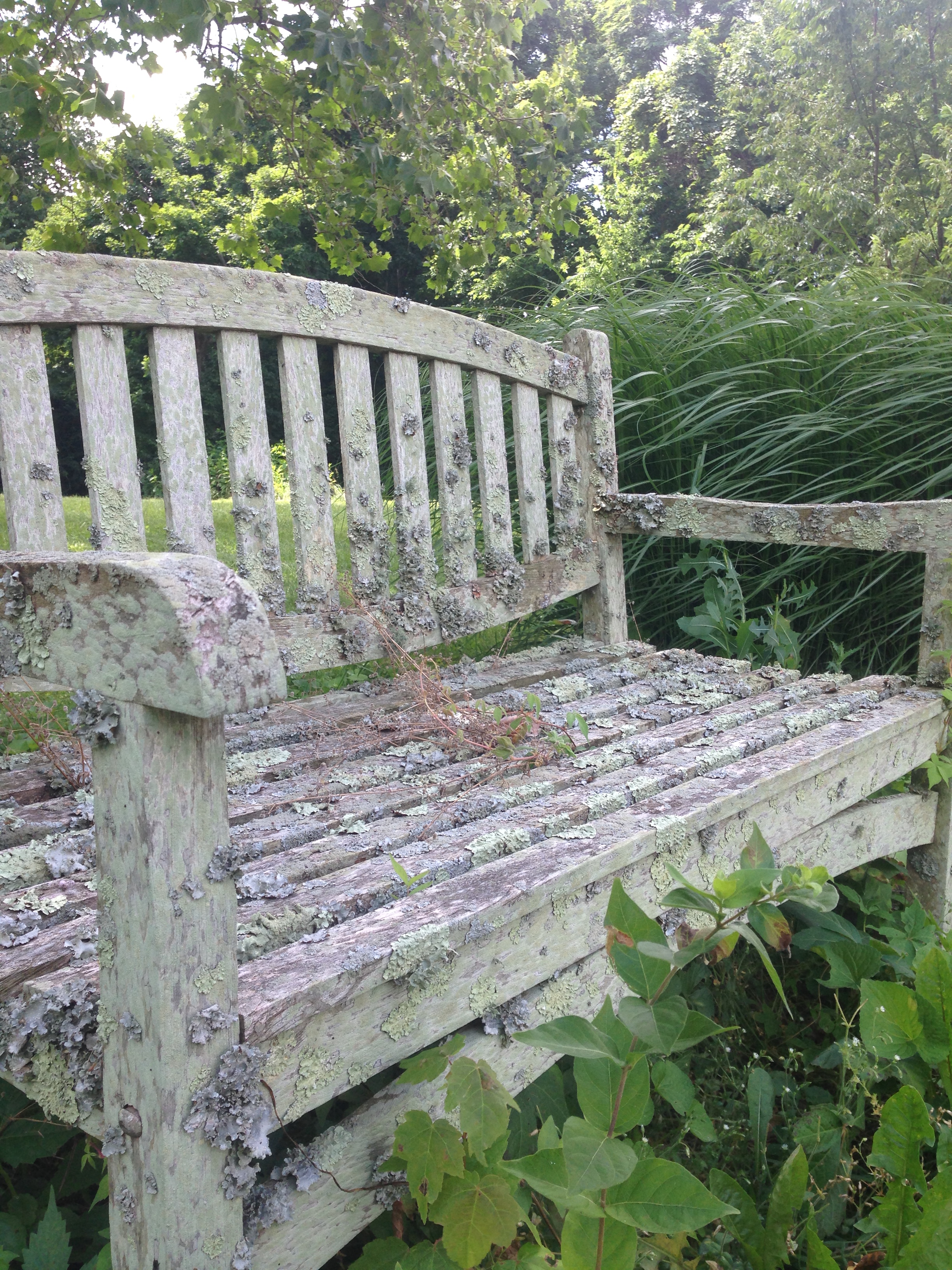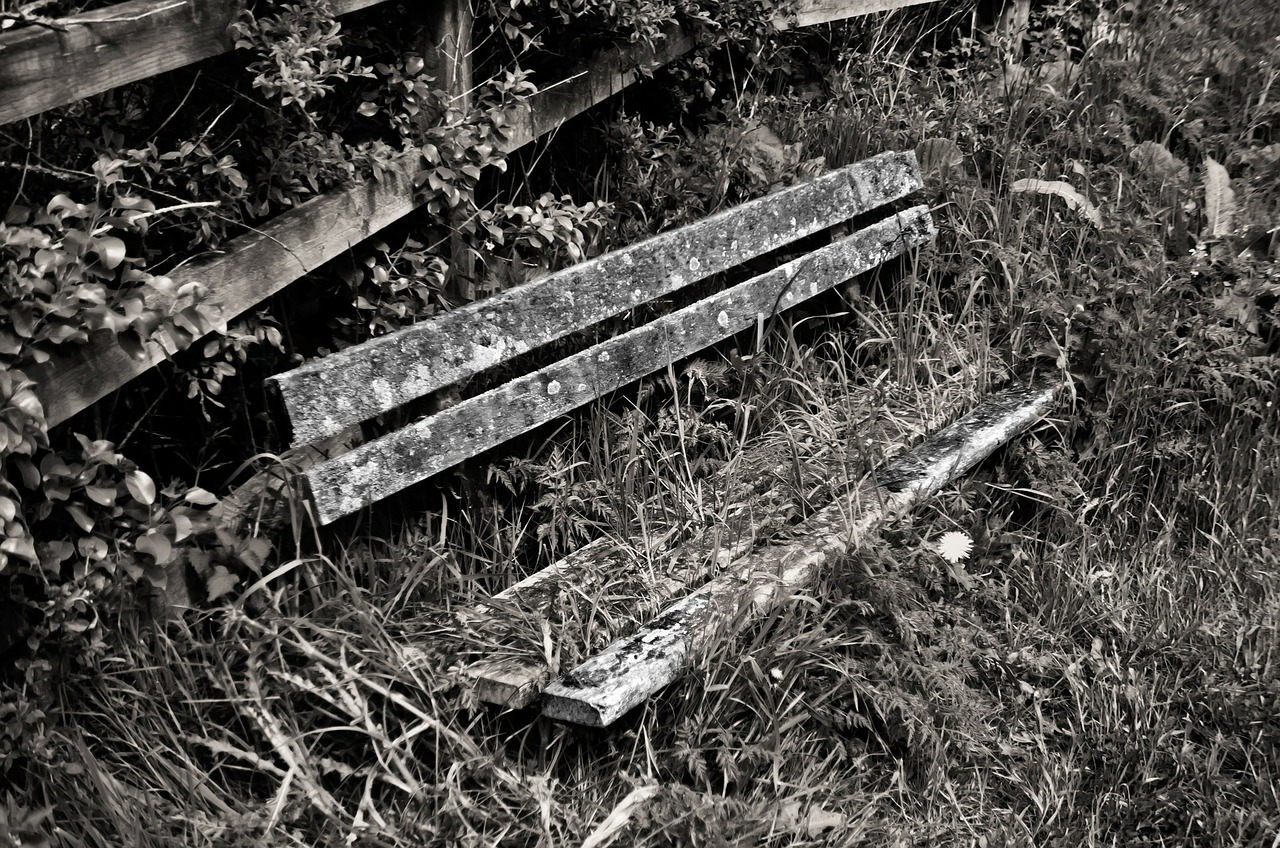My daughter Hannah and I have been walking in the morning. There’s a wooden bench we pass on our route that has captured our attention. It’s a small bench, surrounded by a small garden and a little rock wall. Obviously, this bench was a source of pride and joy to the people who placed it there. Great care was given to make the surroundings beautiful and the atmosphere peaceful.
The only problem is, the bench is covered, completely covered, in a light green moss or fungus, and at this point actually has mushrooms growing on parts of it. The garden is overtaken with weeds and the rock wall is hidden in their growth. It’s a curious sight. There’s a part of me that wants to touch it just to see what it would feel like (old and spongy, rough and hard?!?). But there’s a bigger part of me that just says, as my daughter so candidly put it, “Eww, who would sit there?”
 This whole bench thing has led to some really great conversations with her. We talked about how at one time that bench was new and shiny and obviously cared for. Someone had put a lot of time into where the bench would go, what flowers would surround it, what direction it would face. It was important and new and wonderful in that moment. But now, as we walk past, we think, “Who would want to sit there?”
This whole bench thing has led to some really great conversations with her. We talked about how at one time that bench was new and shiny and obviously cared for. Someone had put a lot of time into where the bench would go, what flowers would surround it, what direction it would face. It was important and new and wonderful in that moment. But now, as we walk past, we think, “Who would want to sit there?”
It’s more sad than it is wonderful. It’s a remnant of a different time; a good time, but a different time, and the only way that spot is going to see life again is if that bench is removed and something else is put in its place. And if that doesn’t happen because the moss-covered bench that can no longer perform it purpose is too loved or too cherished to be removed, then that bench will rot into the ground and eventually that space will no longer have any life at all.
By now, you’ve figured out where our conversation ended up, I’m sure.
Because inevitably my thoughts went to the church. So often I think we have mossy benches in our church. It might be a program. It might be an event. It might just be “the way we do things around here.” Whatever it is, there seems to be a plethora of them. Things that at one time were new and beautiful and cherished, obviously put in place with purpose and care, but time and wear have begun to show their mark, and what once was useful and needed is now a moss-covered monument to its former glory.
That’s not to say all “old” things are not good things or unneeded things or not useful things. In fact, I think we far too quickly get rid of things we should just use a little bit of elbow grease on and bring back the shine. There are times like the story of the fig tree in Luke where what needs to happen is a bit of “digging around the roots” so life and nourishment can return to the system. But there are other times where we need to be willing to recognize it is past fruit-bearing and needs to be cut down.
Because, as Hannah so aptly put it, who would want to sit there? Who is going to hitch a wagon to something that is moss-covered, fruitless, and no longer useful for its purpose? Maybe that’s why we see so many young people leaving the traditional church settings? Maybe they can see something that we can’t see because we love our songs, our stage, our pews, our programs, our Sunday Schools, our “fill in the blank” so much that we can’t see that they’ve grown musty with tradition and covered in rote ritual and are no longer bearing fruit for the kingdom of God.
It’s a difficult thing to consider. Because like that bench, there was love and passion and good, useful, fruit-bearing moments that accompanied these things at first. But we have got to be willing to look, with open eyes and willing hearts, to the practices and programs of our churches and say, “Do we love this more than we love the kingdom of God?” We must be willing to “pray continually” about the good things to make sure they are the God things. We must use the Bible, not as a defense weapon to keep what WE want, but as a measuring stick to ensure we are in line with His will.
be willing to look, with open eyes and willing hearts, to the practices and programs of our churches and say, “Do we love this more than we love the kingdom of God?” We must be willing to “pray continually” about the good things to make sure they are the God things. We must use the Bible, not as a defense weapon to keep what WE want, but as a measuring stick to ensure we are in line with His will.
And, in my opinion, we must ask the children, the youth, the young people…”What do you think?” Because they might just have the exact right new bench ready to take its place and bring life to that spot once again. Before they leave, we need to ask, “What is Jesus leading you to do? Where is Jesus telling you to go? What is God’s call on your life as a member of this body?” And we need, we must, let them follow that call, even if it touches our beloved bench.
As I read this post to my husband, he said, “It’s good. Nothing really outstanding or groundbreaking.” Maybe not, but the truth is, I still see a lot of mossy, musty “benches” in churches. I see ministers and pastors trying to make things work that are no longer workable. I see frustrated parishioners trying to make things wonderful “like they’ve always been.” I see weary leaders trying to keep the old afloat because “it is what it is.” And it may not be new news that we don’t have to do that, but it sure seems like news we need to hear…again.
We don’t need to be afraid of the new thing. God sure isn’t and He has only one thing in mind – to grow His kingdom and share His love. He says, “For I am about to do something new. See, I have already begun! Do you not see it? I will make a pathway through the wilderness. I will create rivers in the dry wasteland.” (Is. 43:19). Life where there was no life. Fruit where there was no fruit. It’s time to ask the questions.
Join the conversation on Facebook at ReFocus Family and Intergen Ministry.
For more information about practical discipleship in the home or transitioning to a more family-focused ministry at your church, go to ReFocus Ministry or “like” our Facebook page.
About the author
 Christina Embree is wife to Pastor Luke, mom to three wonderful kids, and family minister at Nicholasville UMC. She is passionate about seeing churches partnering
Christina Embree is wife to Pastor Luke, mom to three wonderful kids, and family minister at Nicholasville UMC. She is passionate about seeing churches partnering with families to encourage faith formation at home and equipping parents to disciple their kids in the faith. Currently studying Family, Youth and Children’s Ministry at Wesley Seminary, she also blogs at www.refocusministry.org and is a contributing blogger at ChildrensMinistryBlog.com
with families to encourage faith formation at home and equipping parents to disciple their kids in the faith. Currently studying Family, Youth and Children’s Ministry at Wesley Seminary, she also blogs at www.refocusministry.org and is a contributing blogger at ChildrensMinistryBlog.com

